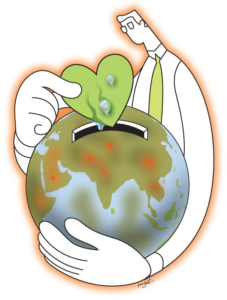Rech highlights the critical role journalism plays in today's time-challenged world, advocates for a more ethical and informed digital ecosystem, and calls on Big Tech to financially support journalism, to offset the "social pollution" that journalism works to clean up.
Have you ever reflected on why you pay attention to content – whether journalistic or entertainment? What catches your attention? What diverts it? When do you connect and disconnect from content? And why?
All of these questions are related to one of the most precious assets of our era: time. Technology can advance without limits, with artificial intelligence, 5G, 8k or 1000 Mbps of internet, but everything comes up against a simple and immutable fact of life: 24 hours in a day are not elastic, not at least without compromising health.
So, it is logical that this most precious of goods is spent on something that makes sense in your life and positively transforms it, as well as society in general.
Such reflections have become crucial for the way of life we will lead from now on. It is not just the separation between truth and lies, reality and fantasy that will define the rest of our century, but what they mean in practical terms in our lives: the choice between democracies versus autocracies, populism versus sincerity, stability versus social disharmony.
The press is not the solution to all the dilemmas of our times, but try to imagine a world without it. Who would debug between facts and rumors? How could you trust something or some institution if there was no certificate of credibility conferred by serious and independent journalistic coverage?
Who would report the emergence of a new cyber scam in which people lose their savings?
Who would investigate corruption and other crimes when government agencies are slow or negligent?
Who would address the ills of Big Tech and the risks that social networks pose to emotional, political and economic stability?
Finally, who would expose the power of corrupt autocrats and their threat to democracies?
How to properly use your time when getting information should be a question that we constantly ask ourselves, either to avoid falling into the trap of over-engaging on technological platforms, or to avoid wasting our curiosity with mountains of useless futility.
Producers of independent journalism are not immune to problems, starting with the sustainability of the activity itself. With a few exceptions, the vast majority of serious media organisations survive with a business model that suffers from the regulatory asymmetry of technology platforms. Because they are based on trust, no organisation can survive by giving up ethics or making its concepts of veracity and responsibility in the dissemination of content elastic, as Big Tech allows.
In a synthetic way, an analogy can be made between the phenomenon of Big Tech and global warming. As a side effect of their business models, large platforms produce social pollution that threatens mental health and the stability of the planet.
It is only fair, therefore, that these platforms pay a ‘support fee’ for professional journalism, which cleans up much of this social pollution. The logic is simple: whoever makes the ecosystem dirty must pay at least part of the massive profit they extract as a result to whoever cleans it.
Instead of dragging us in the wake of false beliefs, charlatans and swindlers who knew how to take advantage of loopholes opened up by the world of algorithms, this could be Big Tech’s greatest contribution to the future of the planet: preventing humanity – through the financing of diverse, robust and independent journalism – from continuing its march towards the abyss.
This column was produced to mark World News Day on 28 September, a campaign to focus on the value of journalism to society, and the need to support it.




